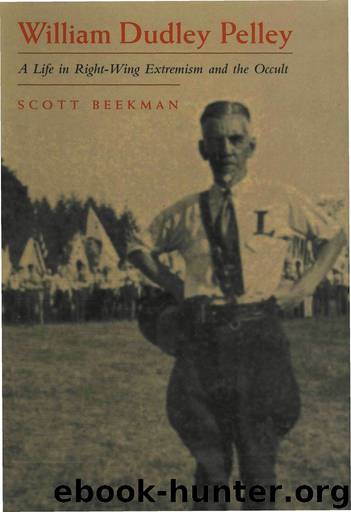William Dudley Pelley by Scott Beekman

Author:Scott Beekman
Language: eng
Format: azw3
ISBN: 0815608195
Publisher: Syracuse University Press
Published: 2005-10-17T04:00:00+00:00
11
Soulcraft
1950—1965
WILLIAM DUDLEY PELLEY'S release from prison in 1950 was perceived by his supporters as a victory over the Communist conspiracy, but it left the former Silver Shirt chief in difficult straits. Although Melford and Adelaide Pearson had kept Pelley's publishing ventures afloat during his incarceration, the absence of new materials and the adverse publicity surrounding his conviction led to ever-decreasing sales. The terms of his parole also limited Pelley's opportunities to rebuild his career. He was enjoined from engaging in political affairs, making a resuscitation of the Silver Shirts impossible. Restricted to Hamilton (and, after 1952, Marion) County, Indiana, Pelley could not undertake the cross-country speaking tours that had proved successful in publicizing his name and raising money before his conviction. Such demanding undertakings would have been difficult anyway; Pelley's advancing age and increasing heart problems slowly sapped him of the boundless energy he had exhibited during the 1930s. At the dawn of a new decade, then, Pelley's fight for freedom represented only the opening salvo in a battle against legal restrictions and marginalization.
Upon his release from prison, Pelley's most pressing problem involved an effort by the state of North Carolina to revisit his 1935 fraud conviction. Claiming that Pelley had violated the provisions of his parole, North Carolina authorities wanted him to serve out his sentence. To that end, Pelley was arrested immediately upon leaving the Terre Haute penitentiary. Indiana governor Henry Schricker readily agreed to extradite Pelley, but the parolee's attorneys successfully forestalled the transfer and obtained Pelley's release on a $1,000 bond. Pelley and his supporters countered the North Carolina charges by claiming that Communists, operating under cover of the Tar Heel state's government, sought to silence him permanently. In December 1950 Hamilton County circuit judge Thomas White ruled that Pelley did not have to serve the North Carolina sentence. Demonstrating a determination that only reinforced Pelley's belief that the Communist conspiracy was behind the proceedings, North Carolina launched a series of appeals that did not terminate until January 1952, when the Indiana Supreme Court refused to hear the case. Thus, seventeen years after his "blue sky" trial, Pelley's legal wranglings with the state of North Carolina finally came to an end.1
Encouraged by the success of his battle against extradition, Pelley launched a campaign to have his sedition conviction overturned. He filed his first petition in September 1953, then hired Chicago attorney Albert Dilling, husband of Red Network author Elizabeth Dilling, to handle the case for him. Dilling appealed the conviction without success in a series of motions, until the matter eventually ground to a halt in January 1955, when the U.S. Supreme Court refused to hear the case. Unable to overturn the conviction, Pelley continued to make monthly visits to his parole officers until his parole period finally ended in August 1957.2
Although legal affairs engaged Pelley for the first half of the decade, he devoted most of his energies to rebuilding his spiritualist movement. In April 1950, along with Melford and Adelaide Pearson, he established the Soulcraft Press, incorporated as a nonprofit organization in 1955 as the Soulcraft Fellowship.
Download
This site does not store any files on its server. We only index and link to content provided by other sites. Please contact the content providers to delete copyright contents if any and email us, we'll remove relevant links or contents immediately.
| Anarchism | Communism & Socialism |
| Conservatism & Liberalism | Democracy |
| Fascism | Libertarianism |
| Nationalism | Radicalism |
| Utopian |
The Secret History by Donna Tartt(16623)
The Social Justice Warrior Handbook by Lisa De Pasquale(11489)
Thirteen Reasons Why by Jay Asher(7788)
This Is How You Lose Her by Junot Diaz(5772)
Weapons of Math Destruction by Cathy O'Neil(5037)
Zero to One by Peter Thiel(4824)
The Myth of the Strong Leader by Archie Brown(4789)
Promise Me, Dad by Joe Biden(4447)
Beartown by Fredrik Backman(4419)
Stone's Rules by Roger Stone(4415)
How Democracies Die by Steven Levitsky & Daniel Ziblatt(4399)
The Fire Next Time by James Baldwin(4343)
100 Deadly Skills by Clint Emerson(4078)
A Higher Loyalty: Truth, Lies, and Leadership by James Comey(4033)
Rise and Kill First by Ronen Bergman(4012)
The David Icke Guide to the Global Conspiracy (and how to end it) by David Icke(3882)
The Farm by Tom Rob Smith(3872)
Secrecy World by Jake Bernstein(3782)
The Doomsday Machine by Daniel Ellsberg(3731)
